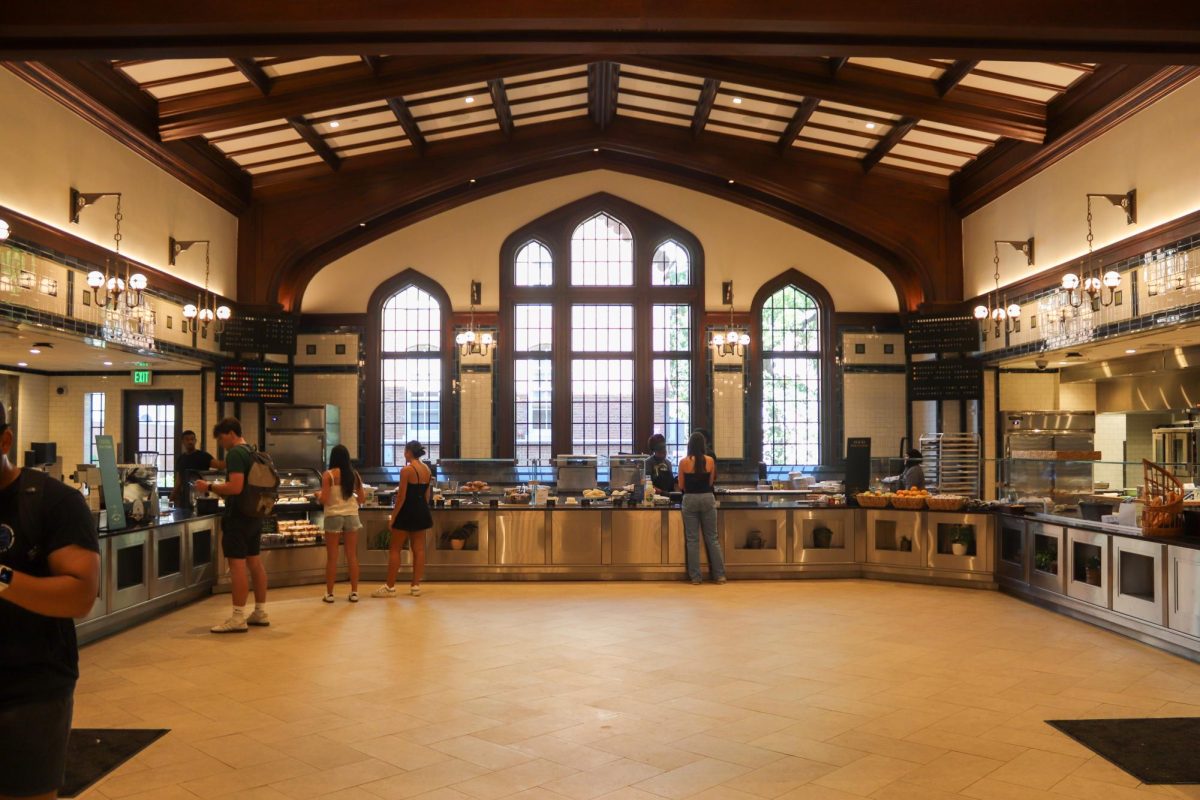One of the first articles I wrote during my time at Vanderbilt was about Campus Dining. It was the fall of 2021, and the university was just beginning to recover from COVID-19. As Campus Dining rebuilt their operations, students were furious with what they saw. As a first-year student with less than one month of experience at Vanderbilt, I decided to contribute to the conversation by calling on students to advocate for change. After re-reading the article, I was disappointed to see that three years later, it still felt almost perfectly in line with the current discourse surrounding Campus Dining.
This fall, Campus Dining again instituted a series of new policies that were received very poorly by students. As a student trying to survive the first week of school, it was quite upsetting that figuring out when, where and if I could find a meal became a larger burden than my classes. But, as a senior who has watched the same conflict between students and Campus Dining ebb and flow for years, I wasn’t surprised. I’ve always felt like every improvement I’ve watched Campus Dining make is two steps forward and one step back — or, sometimes, one step forward and two steps back.
Dining at Vanderbilt used to be a point of pride for this university, but even after years of rebuilding their operations, it still requires hundreds of petition signatures for Campus Dining to fix simple, seemingly obvious problems of their own creation. Now, these problems are affecting Vanderbilt’s rankings, too, with massive drops this year in the Princeton Review’s Campus Food and Quality of Life metrics. The longevity and consistency of Campus Dining’s problems led me to wonder why these decisions with foreseeable negative consequences continued to be made.
To answer this question, I dug into Campus Dining’s recent (and not-so-recent) bad decisions to search for patterns of behaviors that might have led to these recurring problems, along with contacting them directly to better understand the thought process behind their decisions. What I found was a combination of poor analytical reasoning, tunnel vision in problem solving and insufficient regard for the students’ feelings that directly led to many of Campus Dining’s easily avoidable mistakes.
Misinterpretation of data
To their credit, Campus Dining does make many of their decisions on the guidance of data; however, it has become clear that they often interpret this data in a way that misses the point.
When asked about how they reached their decision to close the West End Residential College Dining Halls for breakfast and on the weekends, Campus Dining cited meal swipe data.
“The data reflects that students prefer to visit Rand or Suzie’s for breakfast during the week, and students prefer Rand or dining at one of our Taste of Nashville locations on Friday nights,” Campus Dining said in an email to The Hustler.
At first glance, this information supports their decision to close those dining halls; however, I don’t believe these numbers are telling the whole story. Rand is a popular breakfast spot on weekdays because of its central location, making it easier to stop on the way to class. Suzie’s shares the same benefits and is a quick place to pick up coffee. However, on the weekends, many students may prefer not to trek to a centralized location for their meals. Regarding dinner, their data isn’t entirely accurate either. Although many students go out to eat on the weekends, I believe this is — in part — a reaction to Campus Dining significantly slashing meal options on these nights. The data has been interpreted as a reason to decrease dining offerings, even though the previous decrease in meal swipe usage may be a result of the cuts as well.
This year, Campus Dining initially removed continuous service between meals, reversing an improvement they implemented two years ago. Campus Dining again justified this decision by citing student preferences:
“A survey of students showed that it was confusing to visit dining halls during transition periods since some stations would still be open while others were not as they prepared for the next meal period.”
Their solution to this confusion: cut off between-meal service entirely. In other words, students might get hungry, but at least they won’t be confused.
In both cases, Campus Dining chose to limit dining options for students and felt justified in that decision due to the data they had, but I believe they failed to interpret that data properly. With a little more care and attention paid to interpreting their data, Campus Dining may have made better decisions. They might have realized that students eat breakfast differently on the weekends than on weekdays, that their own policies were pushing students out of dining halls on Friday and Saturday nights and that students’ expression of frustration and confusion may not have been calls to entirely eliminate dining options between meals.
Tunnel vision
I’ve found through personal experience that once Campus Dining sets a certain trajectory, it becomes extremely difficult for them to adjust. I asked Campus Dining about what innovative solutions they were pursuing to address some of the largest concerns students have raised, but they dodged my questions and held firm in their current stances.
I inquired about what was being done to alleviate wait times, and Campus Dining pointed me towards their Waitz app and to-go options, placing the onus on students to search for a less busy dining hall during their breaks between classes. For a student with a short break between classes, journeying across campus to find a less crowded dining hall is not an option. Additionally, I asked them what they had done to reduce the time taken to scan out a ReusePass container.
“The additional time to complete checkout with a ReusePass container is a tradeoff for having a to-go option for those who do not wish to dine-in,” Campus Dining said.
This claim simply ignores the effect the scan out process has on everyone else waiting in line. In both cases, campus dining stuck with their current policies while turning a blind eye to the consequences for students.
I asked if they had explored staggering breaks and days off for dining workers at the West End Dining Halls or if there was a resource problem resulting in these closures. They only responded by saying the following:
“All of our dining halls are sufficiently staffed.”
This comment directly conflicts with the statement released from VSG regarding Campus Dining updates that said,
“Closing the West End residential dining halls ensures that our Campus Dining culinary staff can take appropriate breaks, preventing overwork and burnout.”
How can Dining believe it’s fully staffed when they don’t have enough staff to open their dining halls everyday while providing adequate breaks? Their assessment of being “sufficiently staffed” is only true if they block out the voices of students calling for a return to last year’s dining hours.
The worst example of Campus Dining’s unwillingness to diverge from their predetermined course came last year when they were struggling to retain plates and silverware. Campus Dining confirmed in their response to me that a per-student average of $40 in plates, cups and silverware needed to be replaced last year.
Aside from having the student government send out an email accusing students of theft, they only made one other attempt to recover these lost materials: Searching students’ rooms after they had moved out. Unsurprisingly, they “did not find many Campus Dining items left in the rooms,” likely because students are required to remove all items from their rooms when moving out. Had they better prepared for this reality — whether by asking students to leave plates in their rooms or providing return bins to the dorm floors — Dining may have been more successful in retaining these items.
Moreover, I then asked about why — in the midst of this plate-return crisis — campus dining would close down the plate return station outside of 2301 (now Commodore Pizza Kitchen).
“The station by 2301 was intended to be a receptacle for trash and recycling rather than a formal plate return station,” Campus Dining said.
This station currently houses no trash cans, recycling bins or plate return carts. Even when a practical remedy to a $200,000 problem existed and worked, dining was unwilling or unable to adjust their plans.
If Campus Dining is ever going to improve, they need to be able to see and address the whole picture, not just the most convenient sliver. It’s going to require creativity and adaptability instead of the single-path approach they’ve been taking.
Ignoring students’ feelings
The most disheartening piece of this story — something I addressed in my original piece three years ago — is that Campus Dining seems to disregard how their actions will make students feel. To be clear, I still hold firm in what I said three years ago: Vanderbilt Campus Dining is not operating with evil intent. However, it’s getting hard to ignore all of the inconsiderate things Campus Dining has done to the students over the years. I believe these slights stem from carelessness, not malice, but they need to stop all the same.
The most recent incident came towards the end of last year when Campus Dining partnered with VSG to send an email to the student body regarding the disappearance of “over 50,000 unreturned cups, plates and silverware titled “Hate bamboo silverware? You should read this.” The email alleges (without firm evidence) that students are responsible for the loss of reusable silverware and outlines future actions that Campus Dining will take if these items continue to disappear. I, like many students, initially interpreted this email as a threat from Campus Dining; however, upon further analysis, I believe many of the “threats” from this email were just a further consequence of Campus Dining’s tunnel vision. For example, the email discusses how dining will have less money for special events, which initially seems like a threat but is more likely a symptom of their previously-discussed inability to adapt.
However, there is a piece of this email that I find extremely concerning: the acknowledgement of students’ disdain for ReusePass and bamboo silverware. I understand that Campus Dining doesn’t have an obligation to cater to every individual request, but this issue was so wide-scale that a VSG Presidential ticket made elimination of bamboo silverware a cornerstone of their campaign. This email made it abundantly clear that Campus Dining knew that the student body disliked these programs, yet instead of eliminating them as students wanted, they chose to double down and even weaponize that feedback against us. Thankfully, Campus Dining has now reversed course and plans “to use the remaining stock of our bamboo cutlery and then switch to an alternate, more conventional to-go cutlery option.” However, this course-reversal came months after initially doubling down, and it’s unclear how much longer bamboo silverware will be in use. This behavior displays a gross disregard for the students’ concerns and is a direct betrayal of the trust we put in Campus Dining to take care of us.
Additionally, how can students feel comfortable providing much-needed feedback to Campus Dining when they now have a history of leveraging that feedback against students?
Unfortunately, this is not the first time I’ve watched Campus Dining do things that have disregarded the students’ feelings. They falsely advertised meals as Kosher for Passover, betraying the trust of students who observed the holiday. They created an “All-Access” meal plan that provided less options than the standard meal plans, falsely leading students and their parents to believe they’d truly have unlimited food access. The university even used its power to shut down Swipes for a Cause by threatening students with disciplinary action. They later relaunched the program in a way that allowed the university to keep more of students’ dining payments by only allowing students to donate five swipes per semester.
This is not a one-off incident — it’s an extremely concerning pattern of behaviors. Again, I believe these decisions are a result of carelessness opposed to something more malicious, but that does not excuse these things when they happen. It is part of Campus Dining’s job to care about and for the students; this is not a record they should be proud of.
The results
If you want to see the inevitable product of all of this carelessness and incompetence, look no further than what happened on Aug. 20 when Chef James Bistro in Rand Dining Hall received a score of 75 in their health inspection. One of these violations was the improper storage of a damaged can of artichokes which can create a place for C. botulinum, the bacteria responsible for botulism that can result in paralysis and even death, to grow. This isn’t the first time I’ve watched campus dining’s safety systems fail in a way that puts students’ health at serious risk, either.
Now that we’re a few weeks into the school year, I’m watching the cycle continue. Campus Dining responded to student feedback with claims of improvement. For example, VSG shared that Campus Dining “trains staff to check with students to ensure the portions are satisfactory,” and in a direct response to my questions, Campus Dining claimed the following:
“All locations have reusable metal silverware available at the dining facility and reusable plates and cups or disposable single use options.”
However, since these claims were made, I was denied additional chicken upon direct request at Commons, was forced to use ReusePass at Rand, and was only given access to bamboo silverware at The Pub. I assume these were oversights on their part opposed to intentionally false claims, but it again shows that even in their attempts to improve, there is still an underlying current of deeper problems.
This recurring struggle between students and Campus Dining is exhausting, but it shouldn’t be this way. I think students and Campus Dining would both agree that we have much better things to do than argue about portion sizes and hours of operation every fall, but the students don’t have a choice. Vanderbilt University’s meal plan requirement forces every student to rely on Campus Dining for almost all of our food. The vast majority of students don’t have a way to cook in their dorm rooms, and with meal plans costing almost $4,000 per semester, spending even more money to eat out is not an option for many. We are stuck with Vanderbilt Campus Dining, so we have to advocate for ourselves when we’re not being taken care of.
It’s up to Campus Dining’s leadership to take a long look at their operations and address these major problems. I hope the current leadership can do it, but if they can’t, the University administration needs to find someone who can.
Knowing is half the battle, and I hope to have done my part to shed some light on the situation. Now, it’s up to Campus Dining to either right the ship or find a new captain.








Justice for eaters • Oct 9, 2024 at 7:11 pm CDT
Hustler finally tackling the real problems in this world. How dare they accuse students of stealing dishes/silverware (I have 10 Rand cups that I absolutely love).